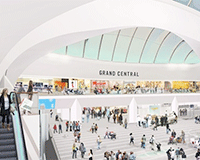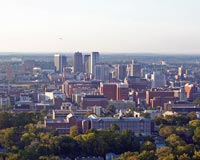
News broke Tuesday night of Sir Albert Bore’s resignation as leader of Birmingham city council, Europe’s largest local authority.
After announcing only a few days ago that he “wasn’t going anywhere,” the Ladywood councillor confirmed he would leave following mounting pressure on his position and two of his Labour cabinet members stepping down, with others threatening to follow.
Sir Albert claims he is stepping down after a total of 16 years as leader, to offer stability amid the growing crisis surrounding Birmingham’s leadership in the wake of a critical report last year from Sir Bob Kerslake. While his tenure has seen great strides in terms of city centre regeneration, long-standing issues like children’s services have continued to linger.
To lose Sir Albert at this time is a severe blow for a city, which is currently experiencing a long-awaited and long-overdue renaissance. To be honest, the timing is lousy, but it could have been worse. Bore is at least handing over the reins of a city that is charging ahead in the right direction.
Just last month the £150m Grand Central shopping centre – and a new £35m John Lewis – opened alongside the £600m redevelopment of New Street station, while big-ticket project Arena Central has netted a large-scale 210,000 sq ft relocation from London in the shape of HSBC. Meanwhile, the 1.8m sq ft Paradise mixed-use development is coming along nicely, as are a myriad of other regeneration and development projects in the city.
Paul Faulkner, chief executive of Greater Birmingham Chambers of Commerce, says: “Sir Albert has driven the economic regeneration of the city and it is partly down to him that the city is enjoying its acclaimed renaissance today.”
Known for being a strong supporter of the property sector, one of Sir Albert’s great strengths was that he understood business.
Both he and director of planning and regeneration, Waheed Nazir, worked tirelessly to promote Birmingham around the UK and overseas, helping to attract investors to the city – and it was starting to pay off.
Going forward, what is crucial is that the city must not lose the momentum that Bore and others built up. It needs to remain focused on its ambitious regeneration programme, despite Sir Albert’s absence.
Gary Cardin, chairman of the Colmore BID and director at CBRE, says it’s up to the private sector to now pull together. “These leadership issues could lead to investors losing confidence as to who is in control of the city. Businesses need to rally round and promote the positives in the market, confirming what is good here while the leadership sorts itself out.” He adds that the situation leaves Birmingham in a “peculiar place” while we wait to see who will take control and what their approach will be.
The fact that there is no obvious successor to Bore is arguably the greatest concern for the city. Placemaking leadership is less about party politics and more about dynamism and charisma. That was amply demonstrated by the fact Bore was welcomed back as leader so heartily by a wide gamut of Birmingham’s business community after his controversy-prone predecessor Mike Whitby left the stage following an unhappy time in the hot seat.
Whoever lands the job next must not only tackle and overcome the long-standing issues such as children’s services, but they must also be able to fill Sir Albert’s rather large shoes. They must continue with his vision for city growth, work together with other councils to bring forward the West Midlands Combined Local Authority, take an active role in the Greater Birmingham and Solihull LEP and continually bang the drum in Whitehall for a better city deal. What Birmingham certainly does not need right now is an anodyne party apparatchik.
Sir Albert says he will stay on until December, not long to find a new pair of hands. But perhaps his successor will be temporary. Doing the right thing (unusual in a politician these days) and taking a hit for issues far beyond his personal control means there may well be a path back to the top spot for Bore in the not-too-distant future. Frankly, if Birmingham is to maintain its position as the UK’s second city, that is something many who live and work there are already hoping for.











